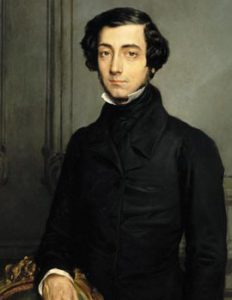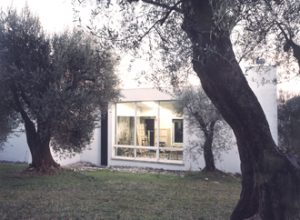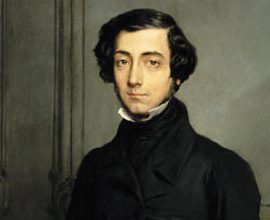
The principal thesis of the second volume of Alexis de Tocqueville’s Democracy in America is that the dominant passion of modern societies is equality. One of its effects would be the “softening of customs,” but it would also engender cultural upheaval and an upending of established cultural objects. For, if it is really aristocratic inequality that has encouraged the creation of works that are considered to be major, democratic society, with its egalitarian calling, would on the contrary be driven toward a culture of entertainment that goes off in search of what is new and easy. That is why Tocqueville saw modern societies as unsuited to the production of significant works of art, citizens there being incapable of elaborating reasonable criteria of evaluation.
While we often see art as a force of opposition (above or alongside public opinion), Tocqueville thus envisages it, on the contrary, as an object that is representative of the general spirit of a society. Great experts on Tocqueville’s thought, Françoise Mélonio and Lucien Jaume retrace for us the point of view of this writer, not an art enthusiast but someone concentrated on democracy and its effects on the arts.
Laurence Bertrand Dorléac
Equality's Effects on the Arts, According to Tocqueville
Lucien Jaume
When Tocqueville published Democracy in America (1835-1840), he brought together in his person several skills that are detectable by someone who analyzes his work: those of a public writer on institutions, a sociologist, a moralist in the seventeenth-century mode (he was a great reader of Blaise Pascal), an author who reflects on the literary arts, and, at times, a historian. One discovers in particular in his work a sociology of the arts in democracy societies. A sociologist even before the invention of this discipline (he anticipated the work of Émile Durkheim), Tocqueville believed in the relative autonomy of social facts, which constrain individuals to follow the general spirit. What he analyzes as opinion (which rules as queen in democratic societies) holds, too, for art in the sense that “everyone makes the law” (following his expression) in artistic matters–though in this case there is suddenly no sovereign master of the changes that take place nor any real law; and yet a constant pressure from the public, from the collective, from the general spirit of a society is exerted on each creative artist. In this sense, here, too, the people are sovereign. Tocqueville is also a sociologist in the sense that (after Madame de Staël in De la littérature dans ses rapports avec les institutions sociales), he made his own Bonald’s formula, “Literature is the expression of society.”[ref]In fact, like Madame de Staël, by literature Tocqueville meant all works of the mind that were in written form, including, for example, history and philosophy. See the comparison with Madame de Staël in our work on Tocqueville (in the Recommended Readings).[/ref] As a matter of fact, for Tocqueville democracy is first of all a form of social life (mores, traditions, representations, and beliefs), a “social state,” to use his own concept, before being a political regime. One can have democracy-society without a democracy-regime: the Second Empire, which he detested, offers an illustration of this thesis. So, one wonders, what about Asia today?
Tocqueville’s Question
In leaving for America in 1831, Tocqueville posed to the only existing democracy of his time the question that was preoccupying him: What forms of authority are possible in a society of individuals who all consider themselves to be equal, up to and including the head of State? This question of a young aristocrat, who thought that, since 1789 and especially since 1830, a world had collapsed forever, was also posed by him in relation to the fine arts, poetry, and theater, which were taken as so many expressions of a society of individuals moved by greed, the search for “material enjoyments,” competition, jealous rivalry, and constant imitation. This was a society in which each person asked himself “Why not me?” For, according to Tocqueville, everyone believes he is capable of doing everything and “everyone hopes to appear to be something he is not.” [ref]Democracy in America (Goldhammer translation), vol. 2, part 1, ch. 11, p. 533.[/ref]
Two Models
Fortified by this question, Tocqueville contrasted the aristocratic model with the democratic one. In the first, artisans and artists worked slowly and in accordance with explicit rules for a rich and demanding public. In the democratic world, which is prey to constant agitation (for each has to make a place for himself with or against the others), “industrial literature” appears: the creative artist proceeds quickly and tends to act when opportunity knocks; one book drives out another (the public buys but does not always have great respect for the product or its author), and a new fashion quickly succeeds the latest model. One’s very vocabulary becomes unstable: each author modifies it a little bit around the edges, introducing his own coefficient of originality outside the compass of any rules, and “since there is no common arbiter, no permanent tribunal that can fix the meaning of the word once and for all, the meaning continues to fluctuate.”[ref]Ibid., vol. 2, part 1, ch. 16, p. 550 (translation slightly modified). [/ref] In this way, Tocqueville the member of the Académie française hardly believes at all in the Académie’s power. Already!
In democracy, thinkers are also in a great hurry: “Everyone is restless: some want to attain power, others to achieve wealth. In the midst of this universal tumult, this constant clash of conflicting interests [ . . . ] where is the calm necessary to the deeper strategies of the intellect to be found? How is one to ponder some specific point when everything is in flux and one is daily swept along and buffeted about by the impetuous current that carried all things before it?”[ref]Ibid., vol. 2, part 1, ch. 10, p. 523.[/ref] Getting talked about: that is the breathtaking life of creative artists in democratic societies.
Romantic Age, Democratic Age
Highly critical of Romanticism (without mentioning it by name), which in fact serves him as a foil for the aristocratic model (seventeenth-century art), Tocqueville is an advocate of the classical criteria of “good writing,” which he calls the rules of “good sense.” One can cite Pascal [ref]“One must put oneself in the place of those who have to listen to us, and try out on one’s own heart the turn one gives to one’s speech, so as to see whether one is made for the other, and so as to assure oneself whether the listener will be as if forced to yield. One must also withdraw as much as possible into natural simplicity, not making big that which is small, nor small that which is big. It is not enough that a thing be beautiful; it must also be suited to the topic; may there be nothing in excess, and may there be nothing lacking therein” (Blaise Pascal, quoted in a textbook of the time, the Études françaises de littérature et de morale, by Philippe-Alexandre Le Brun de Charmettes, 1822). The most read textbook was that of Noël and De la Place, which appeared in numerous editions throughout the nineteenth century.[/ref], François Fénelon (in his Letter to the Academy), or else Buffon or Voltaire, who were the models being offered at the time in textbooks on literature. Tocqueville disapproved of Victor Hugo and his revolutionizing of the dictionary, his encomia for the “grotesque” (his play Cromwell) and, generally speaking, his search for what he called “the bombastic.” Yet Tocqueville recognized one quality in the democratic spirit as applied to the arts: it was drawing attention to man in general, his rights, his dignity, and the mystery of his destiny (Lamartine, for example). Indeed, favoring a connection, a communication between individuals and the imitative spirit, democracy cultivates the use of general ideas, abstract (and somewhat vague) terms, and, finally, “humanitarianism” (as one began to say along with Lamartine). For Tocqueville, this was a point of capital importance, for the democracy of the moderns had led to a rediscovery of the spirit of Christianity; Tocqueville thought that, following the example of America, democracy cannot live without religion, even though the religion of American ministers is oriented toward social utility and daily comfort.
In another connection, Tocqueville confesses his interest in democratic poetry inasmuch as it seeks to fathom the mystery of the human soul. He mentions Childe Harold’s Pilgrimage, René, and Jocelyn. A disciple of a certain kind of Jansenism, he thought that man is a being incapable of knowing himself, and he once even paraphrased Pascal’s formula, “What a chimera, then, is man!” Using the Jansenist theme of the veil set over reality, he writes, “If man knew absolutely nothing about himself, he would not be poetic, for no one can portray a thing he has no idea of. […] Man is sufficiently exposed, however, to see something of himself, yet sufficiently veiled that the rest remains shrouded in impenetrable darkness.”[ref]Democracy in America, vol. 2, part 1, ch. 17, p. 559.[/ref]
Democratic Scales: Small Men and Great Monuments
In all of his developments on art (chapters 9 to 21 of the second volume of Democracy in America), Tocqueville allows his irony to break through many times, in particular apropos of architecture in private residences and public monuments. When he arrived by the East River, he was struck by the sight of white buildings that were Greek in appearance on account of their columns and peristyles, but seen up close, those were residences with wooden beams! The appearance of white marble was an illusion. Tocqueville writes that the democratic individual, seeing himself as quite small in relation to the imposing mass of his equals, has a marked taste for the gigantic, the monumental. Such is the case of the city of Washington, which had as many inhabitants as Pontoise but was laying out for the future a wholly spectacular type of spatial arrangement and giving to the Capitol a name as pompous as its dimensions.
Whence the following remark, whose tone is ambiguous: “Nowhere do citizens seem more insignificant than in a democratic nation. Nowhere does the nation itself seem greater.” [ref]Ibid., vol. 2, part 1, ch. 12, p. 536.[/ref] Tocqueville seems to be predicting that the country’s nationalist fervor will in the future include architectural megalomania.
Painting and Materialism
Educated by his friend Louis Firmin Hervé Bouchitté, a Catholic philosopher who would later (in 1858) write a book on Poussin, Tocqueville sometimes offers insights on painting that were rather critical of his times and of democracy. In those pages, he is clearly speaking much more about France than the United States. He expresses his admiration for Raphael (which was a commonplace during that era) and pleads for a “painting of the soul,” thinking that democratic society, overrun by the search for material satisfactions, wealth, and comfort, neglects spirituality. Contrasting Raphael with Jacques-Louis David, who was overly concerned with studying the body’s anatomy, Tocqueville sees the former as someone who “sought to make of man something superior to man. He undertook to embellish beauty itself.” [ref]Ibid., vol. 2, part 1, ch. 11, p. 534.[/ref]
What Tocqueville is basically expressing in these terms is his entire view of life, which is an extension of his education and his tastes: the aristocratic values are those of personal independence and grandeur, with everything connected to honor. To make of man something superior to man is above democracy’s aspirations. Grandeur (that was De Gaulle’s word) is irremediably lost, yet one can help democracy to know itself better, so that it might avoid its dangers (uniformity, despotism, depoliticization), and this society also has produced its “wonders,” to use an expression Tocqueville repeats many times: liberty-based institutions, the conquest of nature, and the dignity of man, a rediscovery of the original message of Christianity. His mother’s uncle, Chateaubriand, who shared the same artistic judgments, had depicted the “beauties of the Christian religion.” They were in agreement.
Recommended Readings
Jardin, André. Tocqueville: A Biography (1984). Trans. from the French by Lydia Davis, with Robert Hemenway. Baltimore: John Hopkins University Press, 1998. This remains the standard biography (with a few errors).
Jaume, Lucien. Tocqueville: les sources aristocratiques de la liberté. Paris: Fayard, 2008. An investigation into the hidden meanings and the context of the addressees of Tocqueville’s Democracy in America.
Manent, Pierre. Tocqueville and the Nature of Democracy (1993). Trans. John Waggoner. Lanham, MD: Rowman & Littlefield, 1996. A philosophical meditation of the meaning of democracy.
Mélonio, Françoise. Tocqueville and the French (1993). Trans. Beth G. Raps. Charlottesville, VA: University Press of Virginia, 1998.
Mélonio, Françoise with Laurence Guellec. Ed. Alexis de Tocqueville. Lettres choisies. Souvenirs: 1814-1859. Paris: Gallimard, 2003. This volume offers some valuable introductions to selected texts.
Staël. Madame de. De la littérature (1800). Paris: GF-Flammarion, 1971. This is undoubtedly the place where Tocqueville drew his inspiration, including in the contrast between the aristocratic model and modern literature (see the end of the first part).
Tocqueville, Alexis de. Democracy in America. Trans. Arthur Goldhammer. New York: Library of America/Penguin Putnam, 2004.
Lucien Jaume , a holder of the agrégation in philosophy, has received a doctorat d’Etat in political science. A former student of François Furet, Jaume joined the French National Center for Scientific Research (CNRS) in 1989 as a director of theses at the Centre de recherches politiques de Sciences Po. His works (eleven books and some 150 articles or chapters of collective editions in various languages) have borne on Thomas Hobbes (theory of the representative State), the Jacobins, and human rights; during a second period, on Liberalism (L’Individu effacé ou le paradoxe du libéralisme français [Paris: Fayard, 1997]); and then on the hidden meanings of Tocqueville’s Democracy in America, in connection with the problem of modern democratic authority (Tocqueville: les sources aristocratiques de la liberté [Paris: Fayard, 2008], which won the Académie Française’s Guizot Prize). More recently, he has published Qu’est-ce que l’esprit européen? as well as Les origines philosophiques du libéralisme, both from Flammarion (Paris) in 2010. He is a member of the publication committee for Benjamin Constant’s complete works in French (published by Max Niemeyer, and then De Gruyter, with 51 volumes projected), and he recently entered the advisory board for Europe of Princeton University Press. His current topic of research bears on the republican stakes in the foundation of French sociology by Émile Durkheim and his school. Jaume teaches in the PhD program at Sciences Po Paris on the subjects of political legitimacy and the general interest as philosophical concepts and as analytical tools that are either appropriate to or revisable for present-day society.


